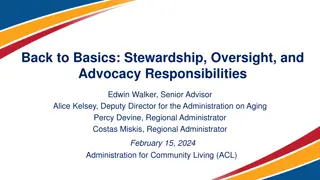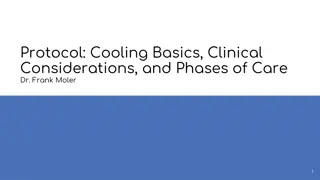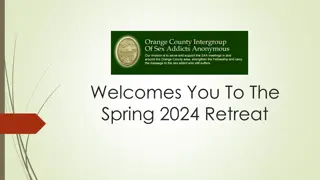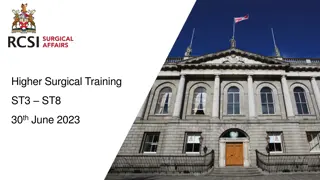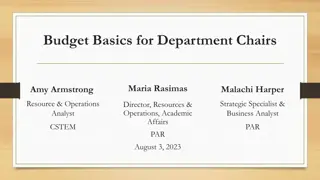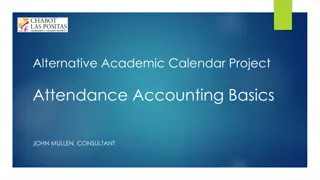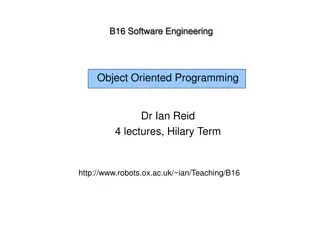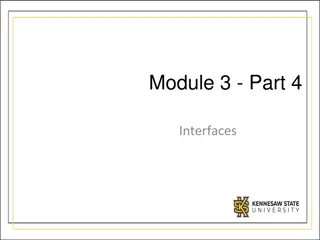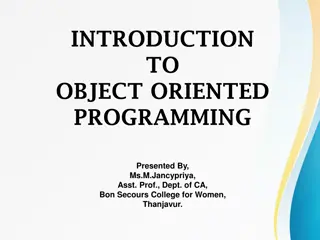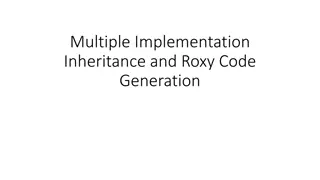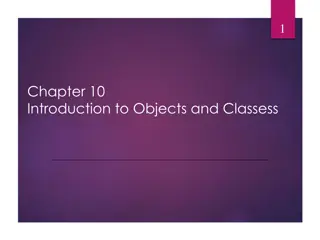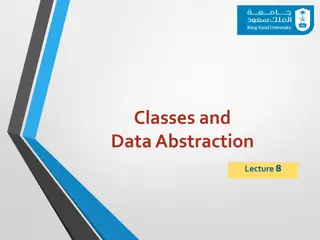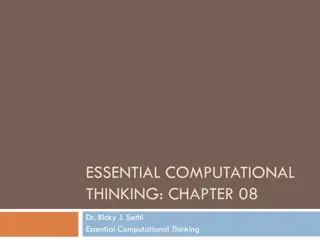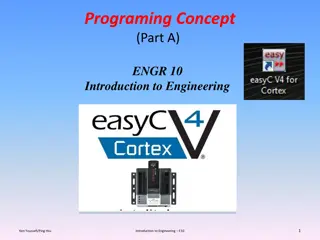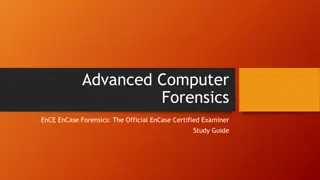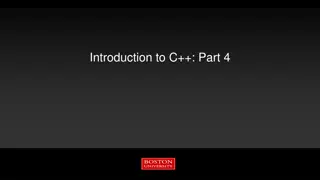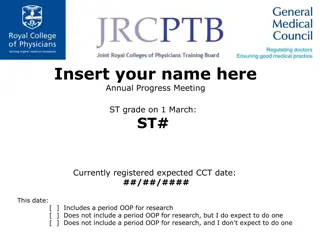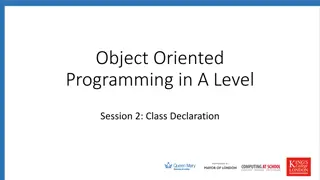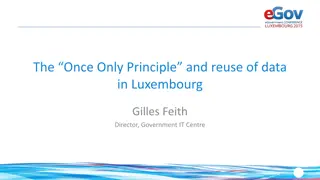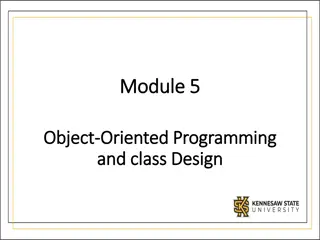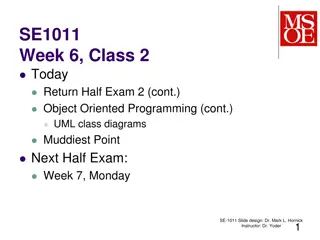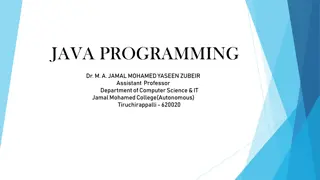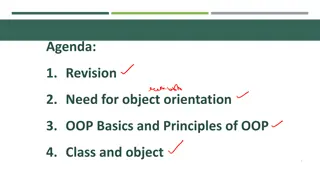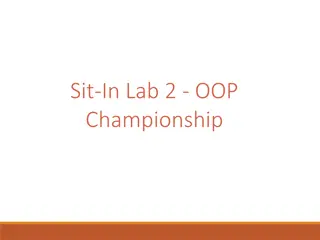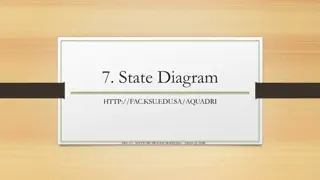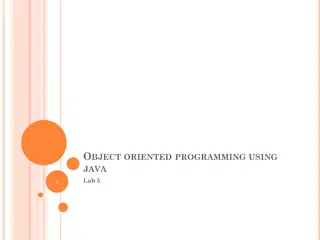Campaign Finance Basics for 2023
The basics of campaign finance for the year 2023, including triggering events for opening candidate committees, disclaimers, yard signs, and campaign finance enforcement.
8 views • 39 slides
Basics of Government Contractors for Beginners
The basics of government contracting for beginners: services offered, NAICS codes, documents for SAM registration, market research, and more. Join our webinar to get started.
3 views • 20 slides
Basics of Assessment
The basics of assessment at Midwestern State University, including the purpose, benefits, compliance, commitment, assessment cycle, and components.
2 views • 15 slides
Protocol: Cooling Basics, Clinical Considerations, and Phases of Care
The essentials of cooling protocols and clinical considerations, focusing on temperature management, thermoregulation basics, effects of hypothermia/cooling, central temperature measurement, and factors influencing target temperature. It emphasizes the importance of safe monitoring and application o
2 views • 72 slides
Understanding HTML/CSS: Basics and Origins
HTML (HyperText Markup Language) and CSS (Cascading Style Sheets) are fundamental programming languages used in web development. HTML provides the structure of a website, while CSS is used for formatting and styling. This article delves into the origins of HTML, its evolution, the basics of HTML and
3 views • 24 slides
Back to Basics: Responsibilities in Aging Administration
Exploring stewardship, oversight, and advocacy roles in aging administration to align with the Older Americans Act. Discussing the importance of holistic program management, integrity in advocacy activities, and current trends driving the need for a back-to-basics approach.
0 views • 46 slides
Organizational Basics Certification & Accreditation Procedures in Jeopardy Round
This Jeopardy round focuses on inter-organizational basics certification, fiduciary procedures, working policies, deferred gifts, and guiding principles. Questions range from committees issuing certifications to legal requirements for planned giving and trust services. Dive into the intricacies of o
0 views • 71 slides
Grant Management Training: Post-Award Basics Workshop
This comprehensive workshop covers post-award basics in grant management, including contracts and grants accounting, new fund requests, grant budgets, personnel actions, purchase order management, financial reporting, and closeout processes. Key steps in the post-award process are detailed, such as
0 views • 37 slides
Understanding Cooling Basics and Clinical Considerations for Patient Care
This presentation delves into essential information on temperature regulation and the application of cooling in patient care. It covers topics such as thermoregulation basics, physiological effects of hypothermia, central temperature measurement, and factors influencing target temperature. The talk
2 views • 72 slides
Introduction to Cryptography: Basics, Terminology, and Significance
Cryptography is the study of techniques used for secure communication, involving creating programs to protect private messages. This overview covers the history, terminology, and significance of cryptography. Explore the basics, cyphers, and the importance of encryption in safeguarding sensitive dat
4 views • 15 slides
Back to Basics: Spring 2024 Retreat - SAA 12-Step Workshop
Explore the Spring 2024 Retreat theme focusing on the SAA Back to Basics 12-Step Workshop, emphasizing honesty, self-reflection, and belief in a higher power. Step by step guidance on overcoming addictive sexual behavior and finding hope in recovery. Engage in self-assessment, uncovering personal st
1 views • 114 slides
Higher Specialty Training (HST) in Surgery: Oversight and Governance
Higher Specialty Training in Surgery provides a structured curriculum encompassing operative procedures, assessments, ARCP, OOP opportunities, research, examination, and the CCST. The program ensures competency progression, post-CCST fellowships, and adherence to governance standards set by organiza
0 views • 26 slides
Online Stock Market Training From Basics to Advanced Strategies
The journey into stock market trading should begin with a solid foundation. Booming Bulls Academy\u2019s basic online stock market training courses are designed to introduce newcomers to the essential concepts such as types of stocks, market orders, and what influences stock prices. Understanding th
1 views • 9 slides
Budget Basics for Department Chairs - Understanding Funds and Processes
This document provides essential information on budget basics for department chairs, covering topics such as types of funds (state and auxiliary), fiscal authority, budget reconciliation, procard and purchasing procedures, and timeline for budget processes. It outlines different funds like General F
0 views • 18 slides
Understanding California Community Colleges Attendance Accounting Basics
Explore the importance of discussing attendance accounting basics for California Community Colleges, especially in transitioning to a new academic calendar structure. Discover how scheduling guidelines are influenced by attendance accounting principles and regulations provided by the state. Uncover
7 views • 46 slides
Object-Oriented Programming in C++ with Dr. Ian Reid - Course Overview
Dive into the world of object-oriented programming with Dr. Ian Reid's course on C++. Learn about classes, methods, inheritance, polymorphism, and design patterns. Understand the principles of OOP and how to implement them using C++. Enhance your skills in data hiding, encapsulation, and templates.
3 views • 78 slides
Understanding Interfaces in Object-Oriented Programming
Interfaces in OOP provide a way for unrelated classes to share common methods without implementation details. They serve as a set of requirements that must be implemented by classes. By creating interfaces, we can enforce standards and avoid issues like the "Diamond of Death" problem that arises fro
1 views • 17 slides
Understanding Object Oriented Programming (OOP) Principles
Object-Oriented Programming (OOP) is a software design approach where programmers define data structures and operations. Key principles include objects, classes, data encapsulation, inheritance, polymorphism, and data abstraction. OOP allows for better organization and reusability of code, fostering
0 views • 15 slides
Understanding Multiple Implementation Inheritance and Roxy Code Generation
Exploring the concept of software building blocks and concerns in Object-Oriented Programming (OOP), highlighting the importance of managing multiple concerns within classes. Delve into the challenges and solutions of multi-concern implementation including the use of mixins and plugin-based imitatio
1 views • 9 slides
Understanding Object-Oriented Programming (OOP) in Python
Python is a versatile programming language that supports various programming approaches. Object-Oriented Programming (OOP) is a popular method in Python where objects are created to solve programming problems. OOP in Python focuses on creating reusable code, following the principle of DRY (Don't Rep
1 views • 35 slides
Understanding Object-Oriented Programming Concepts
Object-oriented programming (OOP) is a powerful paradigm that helps in organizing and designing programs effectively. This summary covers key aspects such as designing a program, top-down structured design, the importance of OOD, defining objects, identity, state, behavior in OOP, and examples of st
2 views • 18 slides
Understanding Classes and Data Abstraction in Object-Oriented Programming
Object-oriented programming (OOP) encapsulates data and functions into classes, akin to blueprints for creating objects. This lecture delves into the relationship between classes, objects, data members, member functions, and user-defined types. It emphasizes the reuse and encapsulation of code, info
5 views • 22 slides
Introduction to Object-Oriented Programming in CS with RPG Example
Today's session focuses on introducing Object-Oriented Programming (OOP) and its concepts through a Role-Playing Game (RPG) example. The content covers the transition from Procedural Programming to OOP, encapsulating data in objects, and practical implementation with a hero, goblin, and multiple mon
0 views • 46 slides
Exploring Graphical User Interfaces (GUIs) and JOptionPane in Java
Introduction to Object-Oriented Programming (OOP) and GUI concepts in Java, focusing on GUI hierarchy, designing GUIs, working with containers and components, utilizing JOptionPane for graphical input/output, and examples of showMessageDialog and showConfirmDialog in Java applications.
0 views • 90 slides
Understanding Object-Oriented Programming (OOP) in Python
Object-Oriented Programming (OOP) is a programming paradigm that focuses on organizing code into objects with attributes and behaviors. Python supports various OOP concepts such as classes, objects, inheritance, polymorphism, abstraction, and encapsulation. Classes serve as blueprints for creating o
0 views • 29 slides
Understanding Object-Oriented Programming (OOP) Concepts in Chapter 8
Delve into the world of Object-Oriented Programming (OOP) through Chapter 8 of 'Essential Computational Thinking' by Dr. Ricky J. Sethi. Explore how classes and objects form the backbone of OOP, how messages are sent between objects, and the difference between regular and object reference variables.
0 views • 29 slides
Introduction to Computer Programming in Engineering
Computer programming in engineering involves breaking down tasks into small steps to instruct a computer. This process requires understanding programming languages such as C, C++, and Java, and concepts like Object-Oriented Programming (OOP). The sequential execution of expressions and the importanc
0 views • 36 slides
Understanding File Systems and Disk Basics in Computer Forensics
Explore the fundamentals of file systems and disk basics in computer forensics, covering topics such as disk preparation, partitioning, volume creation, file system formatting, FAT basics, and file allocation tables. Learn about disk structures, cluster allocation, and the functioning of FAT version
0 views • 24 slides
Introduction to C++: Part 4 - Generics and Templates
Explore the concepts of generics and templates in C++, including syntax, compilation process, and utilization of the C++ Standard Template Library (STL). Learn about object-oriented programming (OOP) principles like encapsulation, inheritance, polymorphism, and abstraction. Discover the power of pol
0 views • 43 slides
Annual Progress Meeting Summary for ST Career Progression
The annual progress meeting for ST grade on 1st March indicated the current status and expected CCT date. The presentation includes details on OOP for research, competence progression, and a snapshot of postings to date. Follow-up evidence documentation for this section is outlined in the subsequent
0 views • 38 slides
Object-Oriented Programming Basics for A-Level Students
Explore the fundamentals of object-oriented programming through class declaration, use of objects and methods, decomposition, abstraction, and more. Dive into topics like declaring classes, inheritance, polymorphism, and class diagrams. Gain insights into Python programming, modules, constructors, f
0 views • 35 slides
Implementation Status of the Once-Only Principle in European Countries
Insights into the adoption and implementation of the Once-Only Principle (OOP) in European countries, including findings, strategies, initiatives, legislation, and establishment of authentic sources to support data reuse. The data showcases the progress made by various countries in implementing the
0 views • 17 slides
Understanding Object-Oriented Programming and Class Design
Object-Oriented Programming (OOP) is centered around classes that serve as blueprints for creating objects. Classes define the structure and behavior of objects, providing a framework for modeling real-world entities. By creating classes and objects, developers can efficiently represent and manipula
0 views • 50 slides
Understanding Object-Oriented Programming Concepts in Java
Clear up confusion on method order, printing variables from other classes, use of "this.xxx," dealing with unnecessary decimal points, object vs. address understanding, syntax preferences, calling methods, private vs. public methods, return types in UML diagrams, and other key OOP concepts.
0 views • 13 slides
Fundamentals of Object-Oriented Programming in Java
Object-Oriented Programming (OOP) is a methodology that simplifies software development by using classes and objects. This paradigm includes concepts like Object, Class, Inheritance, Polymorphism, Abstraction, and Encapsulation. Other terms used in OOP design include Coupling, Cohesion, Association,
0 views • 54 slides
Introduction to Object Orientation and OOP Principles
Understanding the basics of Object-Oriented Programming (OOP) is crucial in modern software development. The agenda covers revision, the need for object orientation, principles, classes, and objects. Questions and assignments provide practical scenarios to apply OOP concepts effectively.
0 views • 20 slides
Managing OOP Championships with ECP Class in Java
Develop a Java program using ECP class to manage OOP championships, simulate match results, and query team information. Utilize classes like Team, Championship, and helper methods to handle operations efficiently. Follow best practices to process queries and avoid static variables for logical operat
0 views • 19 slides
Understanding Object-Oriented Programming Concepts
Learn about essential Object-Oriented Programming concepts such as classes, instances, encapsulation, and abstraction. See how OOP allows for a clear and concise representation of objects in a program while hiding unnecessary details and managing data access through methods. Dive into the world of O
0 views • 17 slides
Software Process Modeling State Diagrams Lab Exercises
Dive into the world of state diagrams and state machine diagrams in software process modeling. Explore hands-on exercises such as creating state diagrams for controlling air conditioners and garage doors. Understand the importance of capturing object states in OOP and learn how to represent transiti
0 views • 7 slides
Object Oriented Programming Using Java Lab 5.1 Overview
The lab covers topics such as Strings, Inheritance, Overriding methods, Super and Final keywords, Abstract classes, and more. There will be a practical OOP quiz before the midterm for Group A and Group B. Examples and explanations on String manipulation, converting between numbers and strings, and t
0 views • 33 slides





